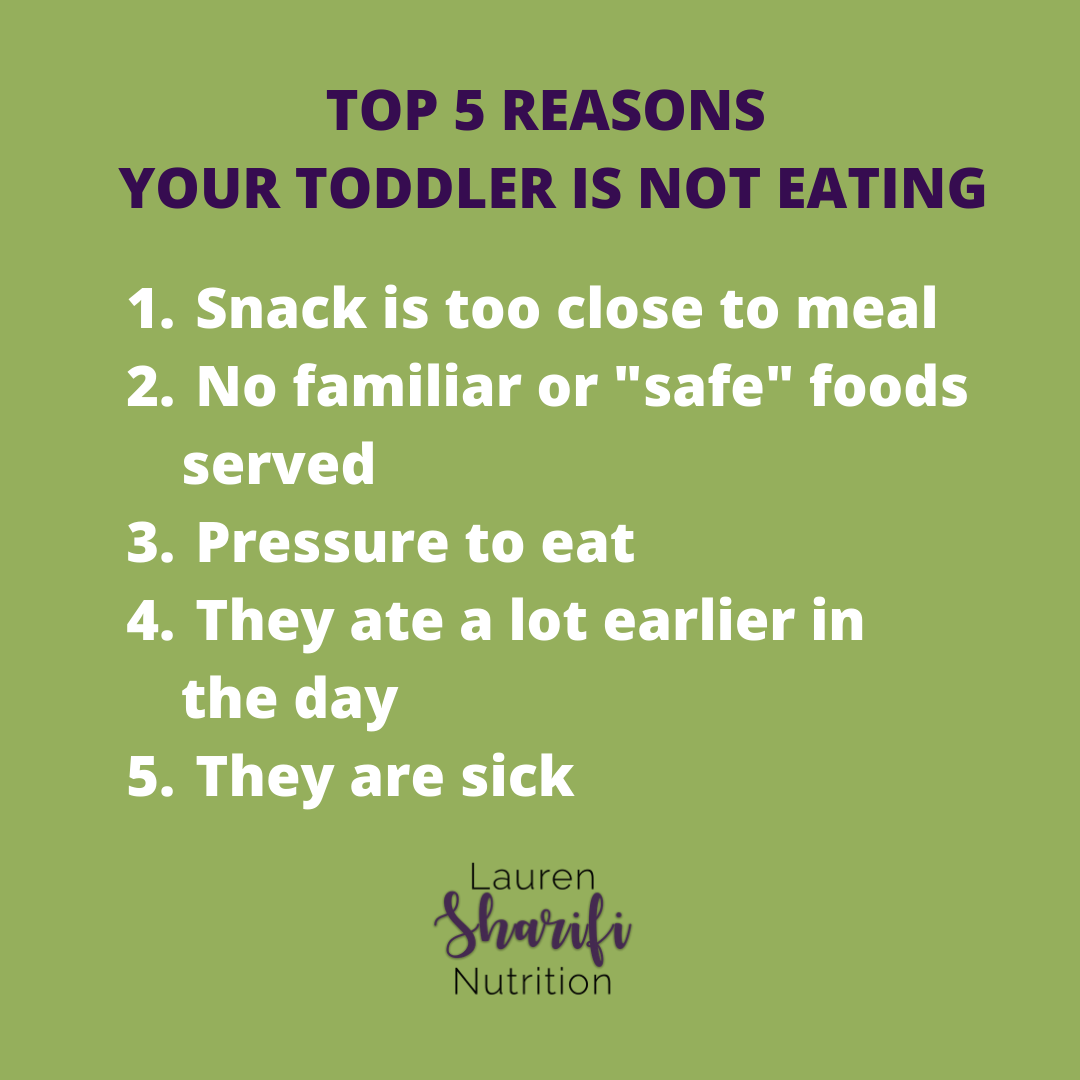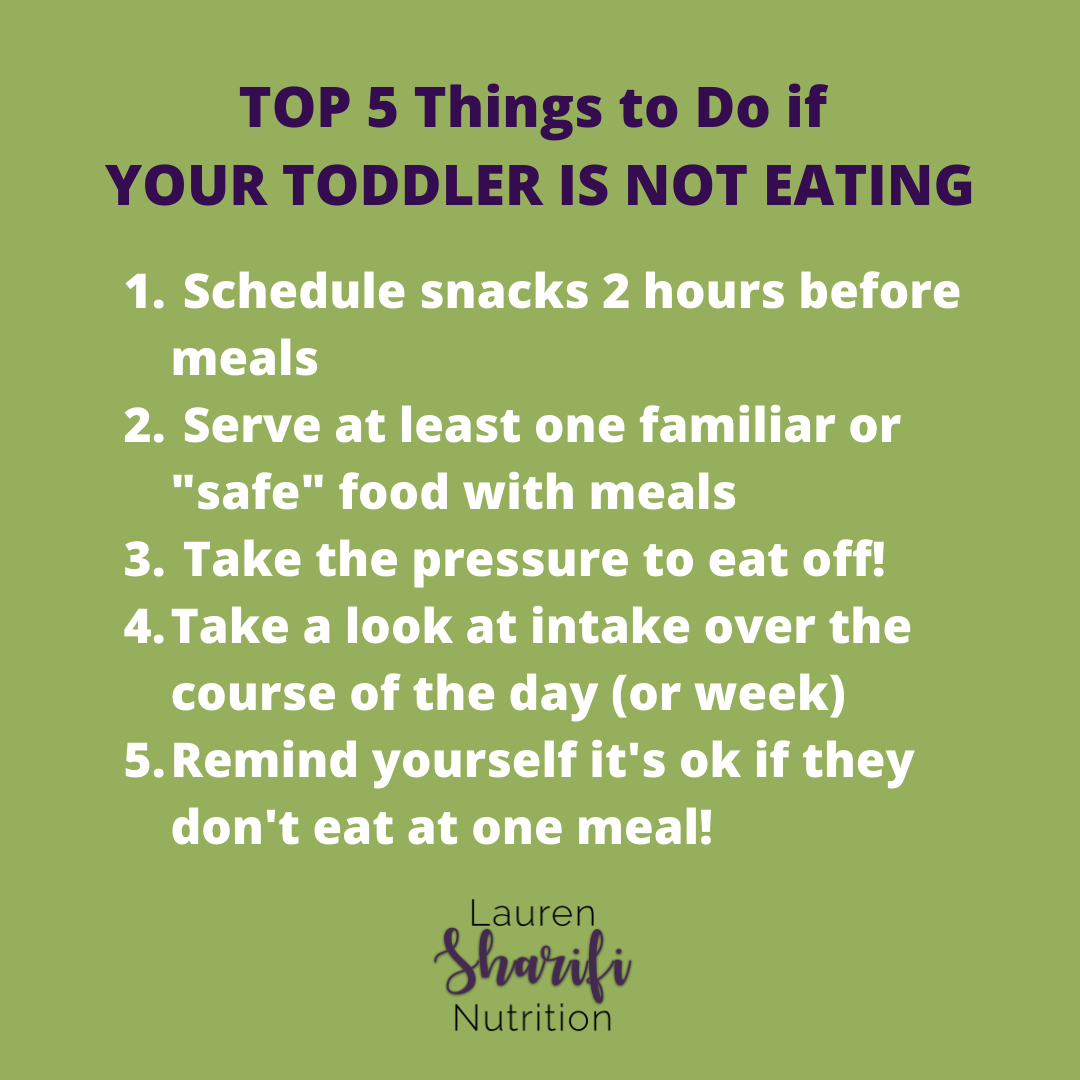Your Toddler is Not Eating, Now What?

Easy Shrimp Dumplings
January 15, 2020
Instant Pot Chicken Chili with Vegetables
February 13, 2020What do I do if my Toddler is not eating? This is one of the most frequently asked questions I get from parents and a topic many parents are concerned about. So here are some answers and actionable tips you can make today!

If your a parent there is a 100% chance this has happened at least once. You make a meal, you think your toddler will eat and they eat NOTHING!
Why Is My Toddler Not Eating?
- They had a snack close to dinner
- The foods offered at the meal are all new or foods they don’t like
- There is pressure to eat at the meal
- Your toddler might be sick
- They ate a lot during they day and are just not hungry

Many of these reasons can easily be fixed to increase your toddlers appetite at a meal. And sometimes it’s OK if they don’t eat anything at a meal! Toddlers are intuitive eaters and will eat based on their bodies needs, if given a schedule, a variety of foods and limited food pressure/rewards.
What Can I Do If My Toddler Is Not Eating?
1. Make sure to have a meal/snack schedule.
If snacks are too close to meals there is a chance they are just not hungry. Plan snacks to be 2-3 hours before meals so when they come to the table they have an appetite and ready to eat.
2. Plan meals with at least one food that is familiar or “safe”.
Offering at least one food that your child likes will ensure (or at least increase the likelihood) that they will eat something at the meal. Offering safe foods also decreases their anxiety at the meal. By reducing this anxiety they may now be more likely to try a less preferred food or even new food. Double win!
3. Avoid pressuring your child to eat any of the food that is served.
Just a reminder its your job as a parent to set the when, where and what of meals/snacks. Your child is in charge of whether they eat what is offered and how much. The “just take one bite” or “if you finish your dinner you can have dessert” tactics will backfire and create food battles. Taking the pressure off ” you don’t have to eat” approach also helps reduce your child’s anxiety at a meal, increasing their appetite and likelihood of eating.
4. Look at intake over the course of a day, week versus at a specific meal
A lot of parents I work with get very lazer focused on one meal. One meal out of 5-7 eating opportunities is truly insignificant. So instead take a look at eating over the day. Maybe your child is eating a lot earlier in the day and therefore doesn’t have a great appetite in the evening. Or vis versa. In other situations, for example, when they are sick. They may not eat much for a couple days then eat a lot more than usual when they are feeling better.
5. Remind yourself it’s OK if they don’t eat at one meal!
If you have done everything above: set a schedule, offered safe and new foods, taken the pressure off and they still don’t eat well at a meal. Remember its ok! Sometimes are kiddos are just not hungry at a meal. Trust that they know how to listen to their bodies.

When Should I Be Worried That My Toddler Is Not Eating?
- Height growth slows (drop in height percentile)
- Poor immune system
- Multiple Vitamin deficiencies
- Complaining of pain with eating
- Avoiding whole food groups or textures
And of course, if you are ever concerned about your child’s eating, reach out to your pediatrician or dietitian.
Are you concerned about your child’s eating? Consider a one-on-one nutrition coaching call. I work with parents in person in Brighton, Massachusetts and virtually around the United States.
Want to continue this conversation? Join my Facebook Group Nourish with Confidence where you can answer your feeding questions and share your struggles and wins with other parents! You can also join my newsletter for my latest recipes, blog posts, resources, workshops and programs. All focused on helping you feel more confident nourishing yourself and your family!
